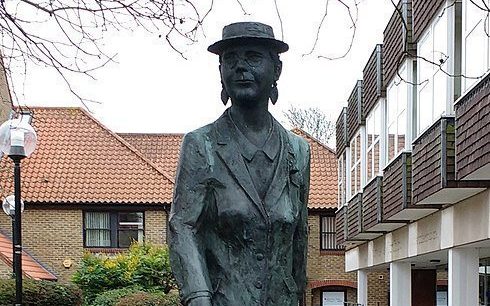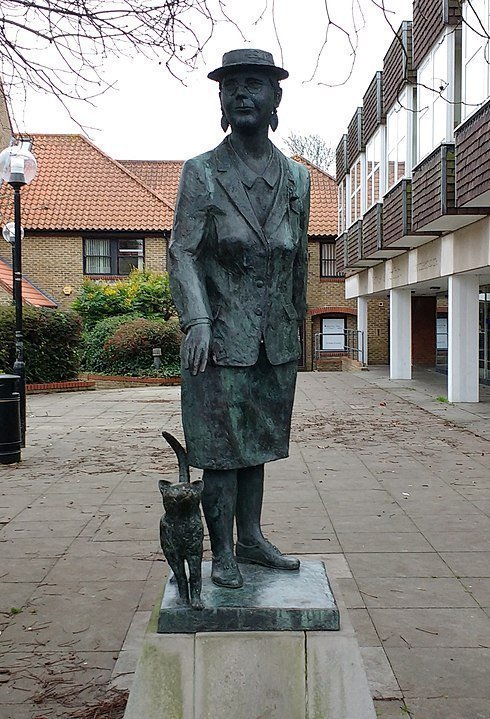

I first heard about Dorothy Sayers a little over a decade ago. Knowing of my appreciation for Agatha Christie mysteries, my now husband recommended Sayers’ Peter Wimsey novels. I did not follow up on that recommendation at the time. A few years later, however, Dan got me The Nine Tailors for Christmas. Over the two months that followed, I devoured the rest of the Peter Wimsey novels, as one does.
What I appreciated about Sayers from the beginning was, perhaps predictably, her easy familiarity with the Greco-Roman Classics, which she integrates so naturally throughout her writing. I knew that she had studied the Classics but did not really know much about her life story at the time. Recently, in an attempt to understand her better, I read David Coomes’ 1992 biography, Dorothy L. Sayers: A Careless Rage for Life—an excellent recommendation from Brian Scoles, an avid reader who had written for the Arena earlier this year about his own eclectic reading tastes. But as I read Coomes, while admiring Sayers’ talent, I also couldn’t stop fixating on what she gave up: being a mother. This loss was, perhaps she herself would have said, the greatest tragedy of her life.
Sayers was a literary success; no doubt about it. Recognized widely as a brilliant thinker already in her lifetime, she continues to inspire readers and writers. But when faced with a choice between being a mother and a writer, she chose her work over her son. True, this is perhaps an overly simplistic interpretation that ignores the pressures and realities of her day. She felt ashamed of her out-of-wedlock pregnancy. The shame was at least partly rooted in the worry over what this dent to her reputation would do to her career as a writer. And so, she threw herself into her work headlong, arranging for her son to be raised by others, and keeping his existence a secret.
Coomes notes that Sayers thought a lot about work and the value of work, starting in her short book Begin Here:
She calls people to spirituality and individuality; she pleads with them to revise their attitude to work. And as a sequel to arguments in Gaudy Night and The Zeal of Thy House, she contends that the whole point of work is satisfaction, not financial reward… Humanist man, rational man, biological man, sociological man, psychological man, economic man, all represent a decline in the wholeness and dignity of man. A fresh conception is call for, and Sayers’ suggestion is creative man.
Or, perhaps, creative woman. For that is who and what Sayers was, first and foremost. But, again, her creativity was channeled towards her writing at the expense of family life. Coomes found little that was positive in her marriage to a man who, when she asked to bring her son to live with them after they married, categorically refused. She never forgave him and did not mourn his death. She just kept on working and writing—during the marriage, and after it ended in her husband’s death, up until her own untimely death at just sixty-four.
It seems unfair to look at someone else’s life trajectory and criticize decisions that this other person we never met had made in a very different time and place. In many ways, after all, many decisions seem forced on the person—by societal expectations, family, circumstances, career, and so on. And I would not say that I am criticizing her here; rather, I am asking the impossible question that, nevertheless, as a mother and a writer of sorts myself, I cannot help asking: what could her life have been like had she had the chance to be a mother fully, raising her son herself? Perhaps she had spent her own lifetime asking this same question; she certainly had a different course in mind for her married life, at any rate, than the one she received.
Recently, as part of research for my latest book project that considers the contemporary devaluing of motherhood, I finally read another twentieth-century classic: Betty Friedan’s The Feminine Mystique (1963). Friedan had intended her book to serve as the clarion call for a new approach to motherhood and work. The proclamation of freedom for women meant freedom from the household. You can do it all! Really! Your children (and you don’t even have to have children if you don’t feel like it!) don’t have to be your ball and chain, keeping you at home and away from the creative work you’d rather be doing.
In some ways, Friedan’s approach sounds exactly like what Sayers lived out. And yet, Friedan is ultimately the anti-Sayers. Where Sayers saw all work as done to the glory of God, Friedan saw all work as done to the glory of the self. And what is the fruit of it?
I look at the fruit of Sayers’ work—writing that continues to inspire and encourage Christian women and men, urging them to think of work less as an idol but as something in which we may live out our calling in that much greater, metaphysical sense. And then I look at the fruit of Friedan’s work—bitterness, anger, despair over the fractured relationships of mothers and children, a disdain of the work of the home that now permeates our society, and an idolization of the modern industrial work complex that is viciously destructive towards our bodies, minds, and souls.
Why work? And, especially, why do creative work, such as writing? Sayers’ answer continues to resonate: to love something greater and more beautiful than oneself; to love other people, past and present, through telling ideas that matter. The love of work as the love of the self can, at the end, only take one deeper into the trough of despair.